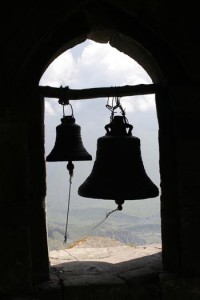Recalling, in the wake of a some recent discussions of Mass obligations, that I had promised some time ago to set out some materials for use in reasoning through another Mass attendance question, I offer some of that now.
Now, it is very common, at least in English-speaking North America, to answer that question with “Four PM”, meaning that, only a Mass beginning after 4 PM on the day preceding that for which one is obligated to attend satisfies one’s Mass attendance obligation. The reason for this near ‘universal’ response is “Dr. John Huels says so.” And indeed he does: “‘Evening’ should be understood as anytime from 4:00 pm onward. The legislator uses the word ‘evening’ (vesper) not ‘afternoon’ (post meridiem); in keeping with the proper meaning of the word (cf. c. 17) an afternoon Mass before 4:00 pm is not an evening Mass and does not satisfy the [attendance] obligation.” CLSA New Comm (2001) 1445. When Huels talks liturgy, people listen. And they should. But what qualifies as a ‘universal’ response in canon law goes considerably beyond what English-speaking North America might hold (even if it is held for very good reasons). Consider these overseas canonical commentaries, three of which hold for a noon start-time and one of which holds for a 2:00 pm start time (my emphasis in each).
From Great Britain and Ireland: What is the ‘evening of the previous day’? Despite the view of some commentators that this [phrase] should be interpreted beginning only at 1400 hours (2 pm) on that day, it is the firm view of this commentary that the evening of the previous day begins at midday (12 noon) on that day itself. GB&I Comm (1985) 702. From Spain: En cuanto a la expressión ‘el día anterior por la tarde’, oficialmente se aclaró: ‘Expresamente se utiliza una fórmula general para evitar casuismos y ansiedades. Con todo certeza se cumple el precepto mediante la participación en cualquier Misa del sábado por la tarde’. Código edición comentada (1985) 594. From Italy: La celebrazione, però, della domenica e delle solennità inizia dai vespri del giorno precedente … ossia, secondo una fondata interpretazione, ab hora secunda post meridiem. Chiappetta II (2011): 522. Plainly, these scholarly authorities hold for a start-time much earlier than is argued for by Huels. But, even if these overseas authors are not correct (and Huels has some good arguments besides Canon 17 on his side, though, frankly, so do the others), they constitute, I think, a large enough school of thought to allow for doubt of law considerations to enter this discussion in support Catholics who hold any Mass attended beginning at 12:00 noon of the day previous as satisfying their next-day attendance obligation. Bottom line, this very practical question question (unlike the two mentioned above, over which there is no serious dispute among experts) needs to be investigated more fully, and settled authoritatively. |
What is the Earliest a Mass can Start on the Preceding Day to Fulfill the Obligation for a Sunday or Holy Day Obligation?
Share
Tweet
Email
Print
Blog Calendar
Blog Categories
- Apologetics (538)
- Art, Music & Science (83)
- Artifacts & Biblical History (220)
- Atheism (27)
- Bible Study (173)
- Biblical Exposition (373)
- Books (77)
- Canon Law (143)
- Catholic Answers Live (161)
- Catholic Controversies (93)
- Catholic Issues (348)
- Church History (96)
- Computers-Software (51)
- Conferences (280)
- Conversions (279)
- Cultural Chaos (34)
- Current Affairs (203)
- Death & Dying (9)
- Eastern Churches (5)
- Economy (6)
- Education (73)
- Evangelization (29)
- Family and Kids (316)
- Footprints of God DVD's (179)
- Friends (55)
- Fun Stuff (474)
- Health/Running (187)
- Heresy, Cults (12)
- Heroic Models (12)
- Holidays/Feast Days (247)
- Homosexuality (43)
- Inheritance Pilgrimages (13)
- Islam (192)
- Israel and Middle East (220)
- Jesus/Godhead (80)
- Jews & Judaism (43)
- Liturgy & Priesthood (173)
- Mary (127)
- Miscellaneous (92)
- Moral/Sexual Issues (296)
- Movies, TV & Media (121)
- Nature & Birds (26)
- News, In the (134)
- Papacy & Catholic Hierarchy (204)
- Patristics/Church History (35)
- Persecution, Suffering (35)
- Philippines (45)
- Philosophy (15)
- Photographs (8)
- Pilgrimage (772)
- Pilgrimages (1,635)
- Pilgrimages Inheritance (1)
- Politics/United States (750)
- Pope Benedict (86)
- Pope Francis (158)
- Prayer & Spiritual Life (213)
- ProLife & Family Issues (494)
- Protestant/Other Christians (150)
- Radio & TV Shows, Steve's (265)
- Radio & TV, others (20)
- Religions, Non-Christian (48)
- Reviews, Critiques, Surveys (161)
- Riddles and Fun (175)
- Sacraments & Sacramentals (150)
- Saints and Fathers (199)
- Social Issues & Action (203)
- Sports & Celebrities (9)
- Steve's Talks & Real Audio (139)
- Steve's Writings (96)
- Teaching & Suggestions (99)
- Theology (113)
- Travel (324)
- Uncategorized (403)
- Video Clips (129)
- Virus (6)
- Virus and Health (11)
- Website, mine (66)
- Website, others (44)




